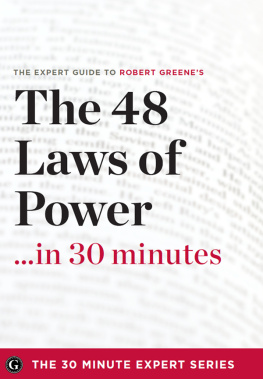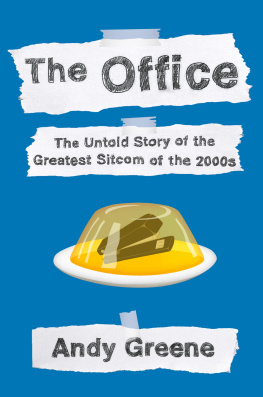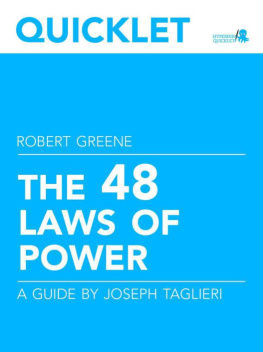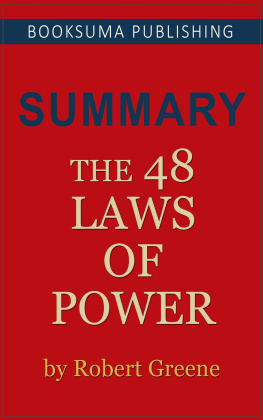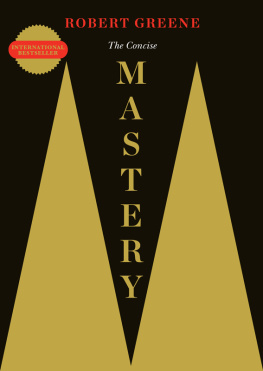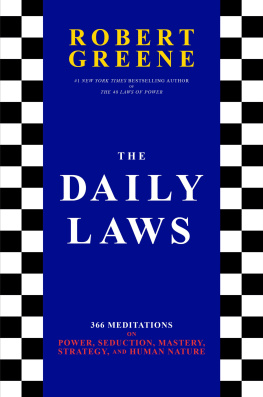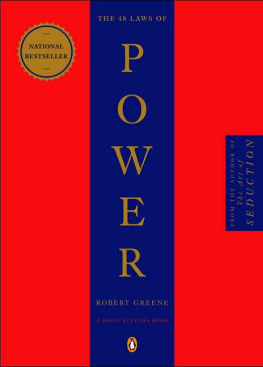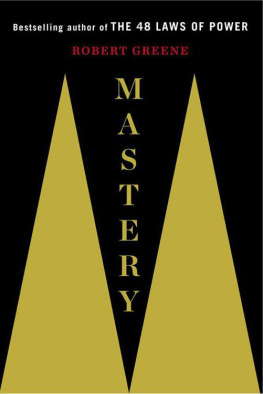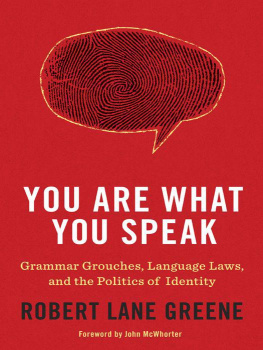INTRODUCTION
At a Glance
This book is an extended review of The 48 Laws of Power, a best seller whose author, Robert Greene, looks at three thousand years of history and distills forty-eight laws for gaining and keeping power from the stories of people who climbed to positions of power. The author provides readers with a kaleidoscope of tales that illustrate these laws, drawing on figures as diverse as P. T. Barnum, Genghis Kahn, French monarch Louis XIV (a favorite of the authors), con man Joseph Yellow Kid Weil, Casanova, Sun Tzu, French diplomat Charles Talleyrand, Otto von Bismarck, Henry Kissinger, and other power players throughout world history. Greene uses their stories to illustrate the use of each particular law and how it can lead to power or how not using it can lead to ruin.
In this book, the laws of morality are suspended and replaced by the laws of obtaining and keeping power. Greene himself calls his book amoral and defends its premise by pointing out that, in his view, society is not based on morality, but rather on obtaining power and keeping it. To believe otherwise, he says, is a path to personal disaster, because those who seek and obtain power will crush those who stand in their way.
This review begins with a brief presentation of the book and its author. Youll learn about Greenes inspiration for The 48 Laws of Power, as well as about his life and work. Then a short digest of readers responses to the book presents the good and the not so good, from professional reviewers as well as from bloggers and other interested readers.
The next two sections of this review offer a synopsis of Greenes book and a detailed discussion of its key concepts. Youll find examples of the key concepts in practice, along with ideas for applying them to your own life.
Finally, the main points of this review are briefly restated, in a way that may well leave you eager to get your own copy of the book and see for yourself what has made this book so popularand so controversial. A list of recommendations for further reading round out this review.
Understanding
The 48 Laws of Power
ABOUT THE BOOK
The 48 Laws of Power grew out of the experiences Robert Greene had as an employee in what he estimates were eighty different jobs. He was never in charge in any of these positions, and like most employees, he was always subject to the authority of people over him. He became fascinated by the idea of power, how it is achieved, and how it is wielded.
With a background in classical Greek studies, Greene knew something about the historical scope of power and those who wielded it. He was also fascinated by the reign of King Louis XIV of France, and he began reading up about Louis XIVs court and the politics and intrigue that swirled about it. Greene then began to study various books on the subject of power. While being subjected to the indignities of being a Hollywood screenwriter (of which there are apparently many), he began to form an idea about writing a book on the subject of power.
In 1995, while working as a writer for a school in Italy, Greene met a Dutch book packager named Joost Elffers. One day as they were walking, Elffers asked him if he had any ideas for a book. Greene told him of his fascination with the court of Louis XIV, and that discussion was the seed for what was to become The 48 Laws of Power.
The book was a best seller, finding an audience not only among business executives (as might be expected), but also among individuals looking to improve their love lives, social standing, or status. Perhaps the most unexpected and most enthusiastic adopters of The 48 Laws has been major hip-hop stars, many of whom have adopted the book as their unofficial bible. In fact, rap superstar Curtis 50 Cent Jackson has cowritten a book, The 50th Law, with Greene, and music producer Quincy Jones, who is revered for his many decades of writing, performing, and producing chart-topping hits, said The 48 Laws of Power is like a martial arts manual for the [music] business.
ABOUT THE AUTHOR
Robert Greene was born in 1959 and raised in West Los Angeles. His father was a cleaning supplies salesman, and Greene lived a modest but typical childhood in 1960s America. After high school, he attended the University of California at Berkeley, where he developed a passion for classical Greek studies. A professor there suggested he continue his education at the University of Wisconsin at Madison, which is where he graduated with a major in classical studies. Greene says his fascination with ancient Greece was almost bordering on mental illness.
After college, Greene traveled extensively throughout Europe. During these years, the eighty different jobs he claims he held included skip tracer (someone who locates a persons whereabouts), hotel clerk, translator, construction worker, magazine editor, playwright, and Hollywood screenwriter. From these experiences, Greene said he learned to resent those who held power over him. He began to read books about the subject of power and slowly developed an idea for a book of his own.
Following on the success of The 48 Laws of Power, Greene has also written The Art of Seduction, The 33 Strategies of War, The 50th Law (cowritten with rapper 50 Cent), and Mastery. All have sold well.
Because The 48 Laws of Power explains how to be a manipulative, ruthless power seeker, it might be assumed that the author exhibits such qualities and has a personality similar to a mafia don or a rampaging conqueror. But those who have interviewed Greene say he is surprisingly self-effacing and even humble. He says he practices the forty-eight laws when he can, but often forgets to follow his own advice.
CRITICAL RECEPTION
The Upside
First published in 1998, The 48 Laws of Power has become an international best seller and has sold more than one million copies in the United States alone. Right from the start, it stirred up a controversy that remains today. Many people consider it a recipe for evil, urging and even condoning behaviors practiced by dictators and scoundrels.
Others, however, see it as a guidepost for success, a map to help navigate the pandemonium and vagaries of life. By arming themselves with some or all of these laws, they believe they have as good a chance as anyone to claw their way to success and power. Publishers Weekly said for those who are truly seeking power, this is an excellent book, although others may find its lack of humanity off-putting. On the blog OkDork, Noah Kagan writes, This book has literally become a guide for which I lead my life. He strongly suggests using a highlighter and sticky notes when reading, and says that ignoring these laws would be nothing short of ignorant. On Blog Critics, Dr. Joseph Maresca says The 48 Laws of Power is an interesting read and can generally be followed by people in a corporation or large organization. But, he cautions, trying to follow each law in every situation could lead to problems, since each corporate and organizational culture is different.
Ox Drover, on the blog Lovefraud, begins his review by considering whether The 48 Laws of Power is a textbook for psychopaths. But he concludes that the book, while initially uncomfortable to read because of its amorality, is important because it demonstrates how people who are trying to achieve power can use or attempt to use those who are not. Reading the book as a way to arm yourself against the ruthless is a popular theme among Amazon reviewers, who give the book an average of four stars (out of five). One reviewer, Buck Rogers, writes:
In ones life, youre better off following the teachings of Moses, Jesus, or Buddha to gain long-term happiness. But the sad fact is, many people live by a very different set of rules, and while most of these folks eventually self-destruct, they can inflict severe damage on our personal and professional lives in the process.
Next page
